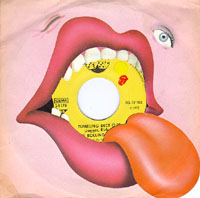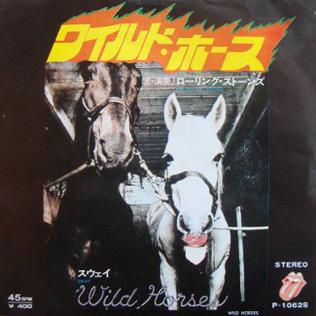Related Research Articles

Exile on Main St. is the tenth studio album by the English rock band the Rolling Stones, released on 12 May 1972 by Rolling Stones Records. The 10th released in the UK and 12th in the US, it is viewed as a culmination of a string of the band's most critically successful albums, following Beggars Banquet (1968), Let It Bleed (1969) and Sticky Fingers (1971). Exile on Main St. is known for its murky, inconsistent sound due to more disjointed musicianship and production, along with a party-like atmosphere heard in several tracks.

Michael Kevin Taylor is an English guitarist, best known as a former member of John Mayall's Bluesbreakers (1967–1969) and the Rolling Stones (1969–1974). As a member of the Stones, he appeared on Let It Bleed (1969), Get Yer Ya-Ya's Out! The Rolling Stones in Concert (1970), Sticky Fingers (1971), Exile on Main St. (1972), Goats Head Soup (1973) and It's Only Rock 'n Roll (1974).

Sticky Fingers is the ninth studio album by the English rock band the Rolling Stones. It was released on 23 April 1971 on the Rolling Stones' new label, Rolling Stones Records. The Rolling Stones had been contracted by Decca Records and London Records in the UK and the US since 1963. On this album, Mick Taylor made his second full-length appearance on a Rolling Stones album. It was the first studio album without Brian Jones, who died two years earlier. The original cover artwork, conceived by Andy Warhol and photographed and designed by members of his art collective, the Factory, showed a picture of a man in tight jeans, and had a working zip that opened to reveal underwear fabric. The cover was expensive to produce and damaged the vinyl record, so the size of the zipper adjustment was made by John Kosh at ABKCO records. Later re-issues featured just the outer photograph of the jeans.

"Brown Sugar" is a song recorded by the English rock band the Rolling Stones. Written primarily by Mick Jagger, it is the opening track and lead single from their ninth studio album, Sticky Fingers (1971). It became a number one hit in both the United States and Canada. In the United Kingdom and Ireland, it charted at number two. In the United States, Billboard ranked it as the number 16 song for 1971.

Metamorphosis is the third compilation album of the Rolling Stones music released by former manager Allen Klein's ABKCO Records after the band's departure from Decca and Klein. Released in 1975, Metamorphosis centres on outtakes and alternate versions of well-known songs recorded from 1964 to 1970.

"Tumbling Dice" is a song by the English rock band the Rolling Stones. It was released worldwide as the lead single from the band's 1972 double album Exile on Main St. on 14 April 1972 by Rolling Stones Records. A product of Mick Jagger and Keith Richards' songwriting partnership, the song contains a blues and boogie-woogie-influenced rhythm that scholars and musicians have noted for its unusual tempo and groove. The lyrics are about a gambler who cannot remain faithful to any woman.

"Wild Horses" is a song by the English rock band the Rolling Stones. It was first released in 1970 by the Flying Burrito Brothers as the Stones didn't think the demo was worth recording fully. It was subsequently recorded by the Stones for their 1971 album Sticky Fingers when they felt it was worth reconsideration. It was also released on 12 June 1971 as a single, with "Sway" as its B-side.
"Ventilator Blues" is a song by the English rock band the Rolling Stones that is included on their 1972 album Exile on Main St.
"Dead Flowers" is a song recorded by the Rolling Stones. Written by Mick Jagger and Keith Richards, it appears on their 1971 album Sticky Fingers as the fourth track of side two.
"No Expectations" is a song by English rock band the Rolling Stones featured on their 1968 album Beggars Banquet. It was first released as the B-side of the "Street Fighting Man" single in August 1968. The song was recorded in May 1968. Brian Jones' acoustic slide guitar on the recording represents one of his last major contributions before leaving the band.
"Sway" is a song by the English rock band the Rolling Stones from their 1971 album Sticky Fingers. It was also released as the b-side of the "Wild Horses" single in June 1971. This single was released in the US only. Initial pressings of the single contain an alternate take; later pressings include the album version instead.
"Can't You Hear Me Knocking" is a song by English rock band the Rolling Stones from their 1971 album Sticky Fingers. The track is over seven minutes long, and begins with a Keith Richards open-G tuned guitar intro. The main song lasts for two minutes and 43 seconds, after which it transforms into an extended improvisational jam. The entire track was captured in one take, with the jam being a happy accident; the band had assumed the tape machine had been stopped, and were surprised to find the entire session had been captured. Originally they were going to end the song before the jam started, but were so pleased with the jam that they decided to keep it in. Besides the regular Rolling Stones members Mick Jagger (vocals), Keith Richards, Mick Taylor (guitar), Charlie Watts (drums) and Bill Wyman (bass), the track also features conga player Rocky Dijon, saxophonist Bobby Keys, organist Billy Preston and additional percussion by producer Jimmy Miller.

"Star Star" is a song recorded by the English rock band the Rolling Stones. It was written by Mick Jagger and Keith Richards. In a few select countries, the song was released as a single from the band's album Goats Head Soup (1973), with "Doo Doo Doo Doo Doo (Heartbreaker)" as its B-side. The song's title was changed to "Star Star" from "Starfucker" after Ahmet Ertegün of Atlantic Records insisted on the change.
"Live with Me" is a song by the Rolling Stones from their album Let It Bleed, released in December 1969. It was the first song recorded with the band's new guitarist Mick Taylor, who joined the band in June 1969, although the first record the band released with Taylor was the single version of Honky Tonk Women. Taylor later described the recording of "Live with Me" as "kind of the start of that particular era for the Stones, where Keith and I traded licks."

"Bitch" is a song recorded by the English rock band the Rolling Stones. Written by Mick Jagger and Keith Richards, "Bitch" is a "hard-bitten rocker" featuring Jagger on vocals and a powerful horn line. It was released as the B-side to the advance single, "Brown Sugar", from their ninth British and eleventh American studio album, Sticky Fingers. It was originally released one week before the album. Despite not being used as an official single by itself, the tune has garnered major airplay from AOR radio stations. The song was recorded in October 1970 at London's Olympic Studios, and at Stargroves using the Rolling Stones Mobile studio.
"Time Waits for No One" is a song by the English rock band the Rolling Stones from the 1974 album It's Only Rock 'n Roll. It was the first song recorded for the album.
"Winter" is a song by the English rock and roll band the Rolling Stones featured on their 1973 album Goats Head Soup. Credited to singer Mick Jagger and guitarist Keith Richards, the song was actually composed by Jagger with the band's lead guitarist at the time, Mick Taylor. It was the first track recorded for the album and does not feature Richards.
"Hey Negrita" is a song by English rock band the Rolling Stones that appeared on their 1976 album Black and Blue.

"Dance Little Sister" is a song written by Mick Jagger and Keith Richards that was first released on the Rolling Stones 1974 album It's Only Rock 'n Roll. It was also released as the B-side of the Rolling Stones single "Ain't Too Proud to Beg" and on several of their compilation albums.
"Good Time Women" is a song recorded by the English rock band the Rolling Stones. A product of Mick Jagger and Keith Richards' songwriting partnership, it is an upbeat song with a blues boogie-woogie rhythm. "Good Time Women" formed the basis of the band's later song, "Tumbling Dice", which was released as a single in 1972.
References
- ↑ "Top 100 Rolling Stones Songs". Ultimate Classic Rock. 12 July 2012. Retrieved 25 September 2021.
- 1 2 Time is on our side (19 March 2000). "Moonlight Mile". reviews of "Moonlight Mile"; quote from Life Magazine. Rolling Stones Mobile Unit, Mick Jagger's home, Newbury, England & Olympic Sound Studios, London. Retrieved 9 August 2013.
- ↑ Fanelli, Damian (3 May 2012). "Interview: Former Rolling Stones Guitarist Mick Taylor Discusses Gear, Bluesbreakers, Iridium and The Stones". Guitar World . Retrieved 25 September 2021.
- ↑ "Moonlight Mile track talk".
That's where Moonlight Mile came from. But Mick first sang it to me in a first-class railway compartment on the way from London to Bristol. Then he had the idea of embellishing it with strings. I contributed the riff that Paul Buckmaster's strings are based on - that ethereal, unresolved ending. (2011)
- ↑ "Interview With Mick Taylor". Classic Bands.
It's not rubbish to say that I was a bit peeved about not getting credit for a couple of songs...
- ↑ Fanelli, Damian (3 May 2012). "Interview: Former Rolling Stones Guitarist Mick Taylor Discusses Gear, Bluesbreakers, Iridium and The Stones". Guitar World . Retrieved 25 September 2021.
- ↑ "Moonlight Mile track talk".
That's where Moonlight Mile came from. But Mick first sang it to me in a first-class railway compartment on the way from London to Bristol. Then he had the idea of embellishing it with strings. I contributed the riff that Paul Buckmaster's strings are based on - that ethereal, unresolved ending. (2011)
- ↑ "Interview With Mick Taylor". Classic Bands.
It's not rubbish to say that I was a bit peeved about not getting credit for a couple of songs...
- ↑ Myers, Mark (2016). Anatomy of a Song. Grove Press. pp. 177-178. ISBN 978-1-61185-525-8
- 1 2 Janovitz, Bill. "Moonlight Mile". AllMusic . Retrieved 28 July 2008.
- ↑ Christgau, Robert. "The Rolling Stones". The Rolling Stone Illustrated History of Rock & Roll. Retrieved 28 June 2007.
- ↑ Myers, Marc (May 28, 2015). "Mick Jagger and 'Moonlight Mile'". The Wall Street Journal . Retrieved April 24, 2016.(subscription required)
- ↑ Hamilton, Jack (10 June 2015). "After Altamont, the Rolling Stones Made One of the Greatest Albums in Rock History". Slate . Retrieved 12 April 2021.
- ↑ Pollard, Matthew (28 December 2023). "10 Rolling Stones Songs That Are Fan Favorite Deep Cuts". Classic Rock History. Retrieved 2023-12-30.